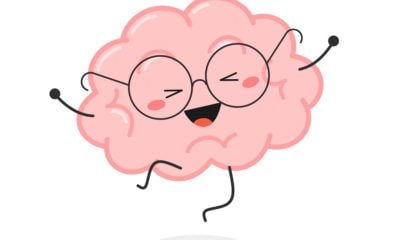How Understanding Locus of Control Leads to Self Empowerment
Understanding locus of control can tell you more about your personality and lead to self-empowerment.
Are you the type of person who believes that negative things in life happen to you because you have bad luck, are cursed, or believe that it’s because people hold a bias against you?
When good things come your way or happen to others, do you credit fate, or even other people?
Or are you the kind of person who believes that everything that happens results from something you did or a decision you made?
If you credit fate, luck, or some other force in your environment, an external locus of control guides your thought process.
If you feel you can control the outcomes of situations in your life through your behaviors and decisions, then you have an internal locus of control.
So what do these things mean?
Is one “better” than the other, and how does understanding the concept help you to be more empowered?
“You may not control all the events that happen to you, but you can decide not to be reduced by them.” ― Maya Angelou
What does the locus of control mean?
Julian B. Rotter developed the concept of locus of control in 1954.
It refers to the degree to which people believe that they have control over the outcome of events in their lives, as opposed to external forces (beyond their influence).
There are two types of locusts of control: internal and external.
People with an internal locus of control believe that they control the outcomes of what happens to them by working hard, making the ‘right’ decisions, and behaving in certain ways.
These people are often highly self-motivated and goal-oriented.
According to Rebecca J. Donatelle, Ph.D. (2011), “Having an internal locus of control is linked to self-efficacy, the belief you have about being able to do something successfully.”
People with an external locus of control rely on or place blame on outside factors.
This could be random chance, environmental factors, luck, fate, or the actions of others.
It is important to note that locus of control is measured on a continuum, as no one has a hundred percent internal or external locus of control.
So is one better than the other?
“It’s not what happens to us, but our response to what happens to us that hurts us.”― Stephen R. Covey
Which is better: internal or external locus of control?
There are downsides to both types and situations where one type of locus of control works better than others.
Here are a few benefits of having an internal locus of control, according to Mathias Seger:
- Belief in one’s control over their life
- Improved information acquisition
- Better decision-making processes
- Self-efficacy, job effectiveness, and higher achievement
- Increase leadership adaptability
There are also some disadvantages to having an internal locus of control.
These include:
- Being often “brutally honest” which can leave people feeling wounded by their direct manner
- Having trouble delegating tasks, because of the need to control everything
What about an External locus of control
Having an external locus of control also offers a few benefits:
- They are often a good team player
- Are good at “letting go” of stressful situations
- Have an easier time accepting that some things are not within their ability to control, which can make them happier
Some downsides to having an external locus of control include:
- Blaming external factors and take little personal responsibility
- They can feel powerless or hopeless more often
- Attribute their success to luck
- Have less resiliency and give up faster
- They have a victim mindset more often
It is good to understand what they mean, and how they apply to your daily life.
You can take a free test here to see how you fall in on the scale.
However, focusing solely on which type you are, and the benefits and downsides of each, shouldn’t be your only goal.
You can use this knowledge to help you understand yourself better and to move toward empowering yourself.
“We all make mistakes, have struggles, and even regret things in our past. But you are not your mistakes, you are not your struggles, and you are here NOW with the power to shape your day and your future.” ― Steve Maraboli
Using your locus of control to become more self-empowered
Self-empowerment means that you are taking control of your life.
This is done by setting goals, making positive choices, and developing an understanding of who you are.
Self-empowered people are honest about their strengths and weaknesses and believe in themselves.
This knowledge and self-awareness aids in other areas of their lives, too!
Self-empowerment leads to better health because people who are self-empowered usually have higher self-esteem, which can lessen the effects of mental health issues like depression.
They make healthier choices because they are aware of the importance of their physical health.
Since they don’t rely on other people’s validation and acceptance, they are emotionally stable, which can improve their relationships.
How do you reach this level of self-empowerment?
Well, there are several ways to improve self-empowerment and they align with characteristics of having an internal locus of control.
Being open-minded and open to possibilities is one way you can take charge of your life.
Instead of assuming that the only opportunities for success are whatever is currently available, open up your mind to creating alternative possibilities.
Changing your mindset from one of hopelessness and anger at a situation to one that gets creative and believes they can do whatever they set their mind to will help you feel more empowered.
“Whether you think you can, or you think you can’t—you’re right.” ― Henry Ford
Use your locus of control to improve your life
Focus on how you respond to the unfair moments and hard times in life.
There are many things that happen in our lives that are beyond our control, but how we react to them is something we can decide.
Knowing who you are and managing your behaviors will help you live life authentically.
How you define success is another thing to know about yourself that will determine how empowered you feel.
You could work a very well-paying job, but if money is not how you view success, then you won’t feel fulfilled.
Understanding the role that failure plays in success is also an important piece of being self-empowered.
The feeling of being empowered comes from overcoming challenges.
Our failures give us a benchmark for improvement, and that growth is necessary for us to learn what we are truly capable of.
You can choose to reevaluate what went wrong, what you could have done differently, and try again.
If you choose to give up and blame your failure on some other side force, then you won’t accept responsibility and learn.
Make some adjustments and try again!
Trusting yourself is something that people with an internal locus of control do easily.
It is an important tool in developing self-empowerment because that trust in yourself will help you achieve your goals.
Our actions directly result from our thoughts.
Instead of doubting yourself, prove to yourself that you have what it takes to reach your goals.
Tell yourself that you are resourceful, capable, and determined.
Building your level of trust in yourself will help you make better decisions because you will learn which risks to take and when to trust your gut when it is cautioning you.
However, you don’t want to lean so heavily into an internal locus of control that you become stressed.
There are truly things you can not control, like the reactions of others.
Self-empowerment also means that you understand when it is time to try something else or let go of a belief that is no longer serving you.
Final thoughts on locus of control
Like everything in life, too much of a good thing can be a bad thing, and the same goes for your locus of control.
Use this understanding to help improve yourself and take your power back, creating the life you want.
Don’t get too hung up on being one way or the other.
Take small steps each day until you see a change in your behavior that is working for you.
“There is great change to be experienced once you learn the power of letting go.
Stop allowing anyone or anything to control, limit, repress, or discourage you from being your true self!
Today is YOURS to shape – own it – break free from people and things that poison or dilute your spirit.”― Steve Maraboli
What is one thing you will do today to become more self-aware or self-empowered?
Share your goals in the comment section below.











